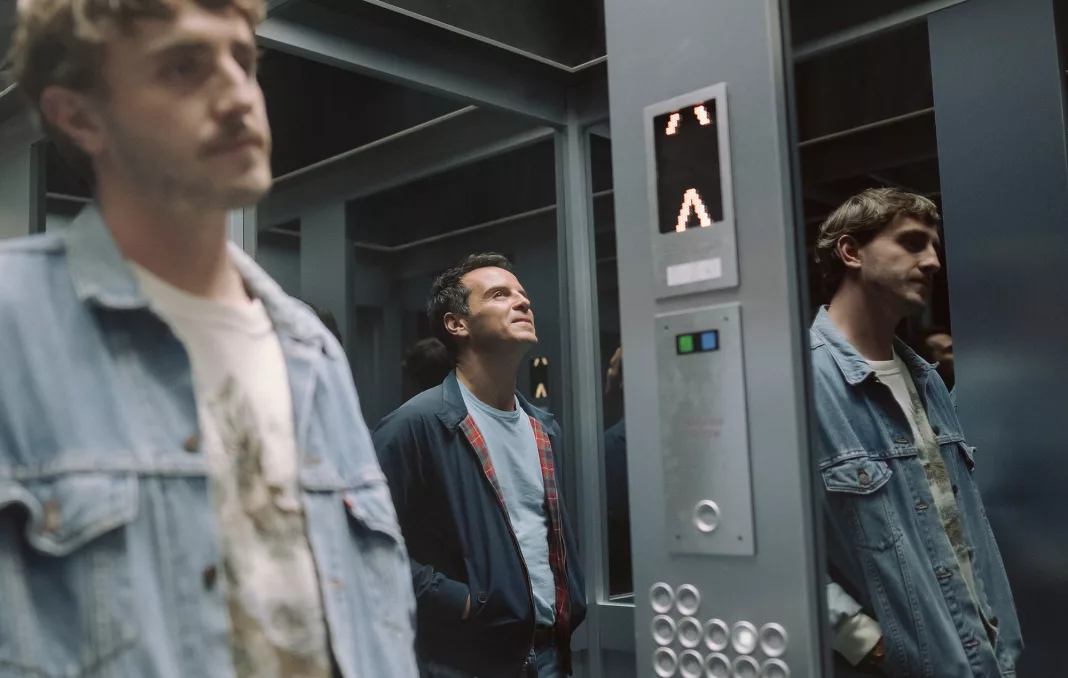In All Of Us Strangers, writer-director Andrew Haigh leads us by the hand into a dreamlike, introspective world. The film begins with Andrew Scott’s Adam staring out of his window over London, watching the glittering lights of skyscrapers hovering in the darkness, like a constellation of stars, just out of reach.
Adam lives by himself in a faceless London apartment block. His life is routine, lonely: toiling away over his next manuscript, procrastinating, reheating leftover takeaway, falling asleep watching television. It quickly becomes apparent that Adam is one of the only people living in his building, with almost all the other rooms being empty. His only neighbour, Paul Mescal’s Harry, appears at his door one night with a bottle of whisky.
‘Japanese,’ Harry says. ‘It’s meant to be the best in the world, but I don’t know why.’
His eyes betray a kind of desperate loneliness that is perfectly mirrored in Scott’s. These are clearly two men trapped at the edge of society, yearning for connection, yet unable to find it. Of course, a tentative relationship begins to blossom between them.
Interwoven with this romance, this burgeoning connection between two strangers, is Adam’s experiences returning to his childhood home, as he pines for his lost connection with his parents. It is quickly established that Adam’s parents have died, but on returning to their old house, he begins to see them again, exactly as they were when they passed in the eighties. There is a wistful seam of nostalgia that runs throughout the film: Adam keeps his childhood toys under his bed and rifles through old photos of himself, and the soundtrack is filled with eighties tracks that Adam plays on his record player.
Watching the film, its emotional impact strikes most, gradually building over the course of the runtime to deliver itself like a gut punch in the film’s later scenes. The cast, chiefly Scott, achieves this with a remarkable tenderness. Especially affecting for me were the scenes between Scott, Claire Foy and Jamie Bell – who play Adam’s mum and dad respectively. The relationship between them and their son is rendered brilliantly. It would have surely been tempting to paint them as perfect parents, lacking any nuance in their characters, but they are portrayed entirely realistically, each with their own foibles. They may crack jokes with their son, and the three actors have such a brilliant chemistry together that you can believe they are a family, but they are not perfect parents. Both have flaws and regrets. Adam’s mother struggles to accept her son is gay, and Adam’s dad struggles with not being more supportive of their son.
Over the course of the film, their great regret at their struggles to raise their son, at chances missed, and ultimately their greatest regret, missing him grow up, simmers. At points, this bubbles to the surface. These are three people who deeply love each other, but who are chained to regret. And of course, they are all painfully aware that this reunion between parents and son – which to me has more the quality of a dream than a ghost story – is not permanent. Like all great dreams, it must end.
Adam and Harry’s relationship, delicately fitted between these scenes, is equally engaging. Both Scott and Mescal are subtle enough that they can pull off a relationship between them convincingly, and they have such a chemistry on screen that scenes between them never fail to engage. This is made even more impressive by the fact that most scenes between them take place only in Adam’s apartment, very rarely broken up by the couple going outside. There are few supporting cast members in the film; beyond Mescal, Scott, Foy and Bell, there are almost no other people. Most scenes have a narrow depth of field, so that anything that isn’t Scott or Mescal’s face is smushed into the background. Again, all this adds to the dreamy, trance-like feeling of the film, but it also means that most of the film rests on the performances of its four main stars. That they entirely live up to this task is nothing short of remarkable.
In addition to some superb performances, heavy lifting is also done by the delicate screenplay, excellent editing and a phenomenal soundtrack, with some great needle drops. In that way, it seems reminiscent of another Mescal film, Aftersun, which featured a needle drop of Under Pressure that sticks out as one of the most profoundly affecting moments in the film. Several moments in this film, often accompanied by similar needle drops, left me similarly raw.
It’s a phenomenal achievement: in All Of Us Strangers’ small-scale and dreamlike narrative is contained a sweeping portrait of both familial and romantic love – rendered in all its regret, heartbreak and, ultimately, joy.


